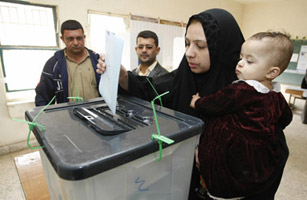
A Sunni Muslim woman casts her vote during provincial elections in Fallujah.
"This time we won't let those people who have let us down in the past reach power again."
—Lubna Naji,
a Baghdad medical student planning to vote in Iraq's provincial elections, to the BBC.
On the last day of January, some 14,000 candidates stand for office in Iraq's provincial elections, the first to be held since 2005. Voters in 14 of Iraq's 18 provinces — including Sunni Muslims who had boycotted the previous contest — choose 440 council members in the mostly peaceful elections, widely hailed as a positive omen for the young, fledgling democracy. Secular parties perform particularly well, a result viewed as reflecting widespread discontent toward religious parties which have come to be considered corrupt and ineffective in power — as well as an endorsement of Prime Minister Nouri al-Maliki. Weeks earlier the vast, $736 million U.S. embassy opens in Baghdad, and on New Year's Day the U.S. cedes formal control of Iraqi airspace and Baghdad's fortified "Green Zone," which one Iraqi solider tells the Washington Post is "a matter of pride."